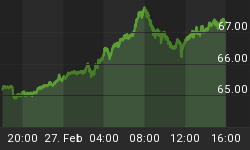The broad market in recent weeks hasn't exactly been kind to the shorts. Depending on the stock sector in question, short squeezes have become quite common and have killed off more than a few bears.
But have the bears been wrong altogether in their urge to sell short the stock market? Or have they just been a bit too early? To answer that question you need only to turn to the financial press for some valuable clues.
One reason why the market has been immune from sustained decline of late was uncovered in a Feb. 28 Business Week magazine article entitled "Why the shorts have long faces." The article looks at how traders are taking advantage of a new SEC rule to bid up shares of shorted stocks. Business Week explains that a new SEC regulation is cracking down on the practice of "naked shorting," in which brokers executive a short sale without having a firm arrangement to borrow shares of the stock being shorted...and then discover they can't locate the necessary stock. "The new regulation is prompting brokers who can't deliver stock within 13 trading days to close out customers' short positions," says Business Week.
The article goes point to point out that since early January major stock exchanges have had to publish daily lists of companies for which sellers have failed to deliver sizable amounts of stock to buyers in a timely fashion. "The daily lists signal to other trades that they can pluck profits by mounting a short squeeze in stocks, such as Martha Stewart Living Omnimedia, that are already moving up on positive news.
Evidently, some brokerage firms are passing on to their customers fees-per-month-per-share on some companies that have hard-to-borrow stocks. For instance, at Harrisdirect, investors who want to short the stock of Travelzoo Inc. Must pay an extra fee of $31.40 a month per 100 shares they want to short, according to Business Week. According to the article, Harrisdirect officials acknowledge that the fees are putting a damper on short-selling activity. "It has had an impact," says Harrisdirect's chief operating officer Michael Hogan. "In some of these stocks the economics become uninteresting."
Aside from the clear implication that the shorts have been getting squeezed a lot in recent weeks (in part reflecting the upside tendency of the major indexes), what is the point of this magazine article? Could it not be to scare away potential short sellers for the next stock market top...which isn't too far away? I think it just may be!
Another example of the art of short selling being portrayed as "vice" in the financial press was found in a recent Financial Times guest article written by James Altucher, managing partner at a hedge fund and author of the best-selling book "Trade Like a Hedge Fund." Altucher's article was entitled "The long and the short of short trading" and in it he asks, "...does shortselling turn out well in general?" His answer: "I am not sure that...[it] works out profitably."
He goes on to offer a look at how well professional short-sellers and hedge funds in general fare in shorting stocks. "On average," he says, "they are uninspiring. Take 2001. The S&P was down more than 10 per cent, the NASDAQ more than 20 per cent. The events of September 11,2002 caused the market to crash and many stocks hit multi-year lows. So how did the shortsellers do? The CSFB/Tremont Dedicated Short bias Index, which tracks the hedge funds that only sell short, was down 3 per cent -- better than the market but not great."
He concludes by asking, "So does shorting ever work?" His answer: "That is a tough call. For some hedging purposes, shorting is acceptable. I avoi dit. It leaves me with less cocktail-party fodder, but, I hope, more money."
Not exactly high praise from a professional in a sector who is presumed to be adept at short selling.
My observation has been that whenever the mainstream financial press draws attention to the practice of short selling (which is rare) it is usually for the purpose of either encouraging short selling at precisely the wrong time, or else discouraging shorting when it might otherwise be a profitable course of action.
For example, during the mini-bear market decline of August-October 1998, the Wall Street Journal ran an article in the Oct. 14, 1998 edition headlined, "'Bullet' strategy makes comeback as traders find a way to skirt rules on short selling." It went on to describe the bullet strategy of "married puts," a complicated technique allowing traders to sidestep rules that prevent short sales when the stock's share price already is falling steadily. "You can really crack a stock this way," one trader was quoted as saying. Of course, by the time this article was published the market had already put in a bottom and from there rallied back up to a new high before the year was through.
Flash forward to the October 2002 stock market bottom. CNBC was expounding on the "virtues" of short selling and was obviously trying to encourage the public to start heavily shorting. From there of course the market took off and rallied virtually straight up into December. Suffice it to say the mainstream financial press has an unenviable record of telling people when to short (or when NOT to short) at the wrong times!
The moral to this story is that you shouldn't always follow the lead of the mainstream press, especially on the subject of short selling! We'll have more to say on the subject of shorting in a later commentary...















